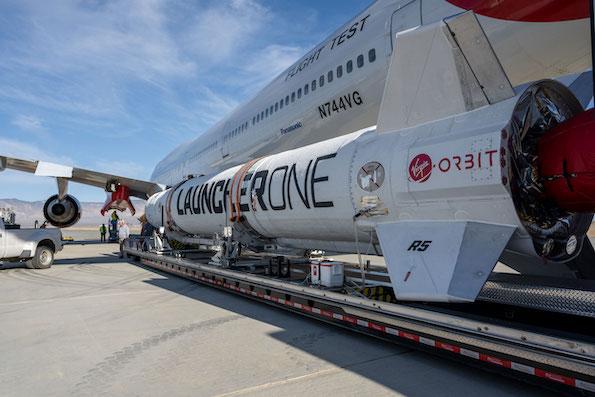
LONDON—Virgin Orbit has loaded its LauncherOne rocket, and technicians are preparing to fuel it in readiness for the first orbital launch from the UK, planned for Jan. 9.
Preparations for the so-called Start Me Up launch were in “full motion” but could still be challenged by weather conditions, CEO Dan Hart said at a press conference at Spaceport Cornwall on Jan. 8. The spaceport has been facing gusting winds and heavy rain in recent days, but forecasts suggest these will abate by Jan. 9. “We’re going to proceed very cautiously on this flight,” Hart said. “We’re in different airspace than we have flown before, but our pilots are ready. We want to make sure we give them every opportunity for a successful mission.”
LauncherOne, with its payload of nine satellites, was mated to the carrier aircraft, the modified Boeing 747-400 dubbed Cosmic Girl, at the end of last week, and teams have been undertaking a series of rehearsals in preparation for the launch. The first opportunity is planned at 22:16 UTC on Jan. 9, with several other opportunities over the next two weeks. The Start Me Up mission—a collaborative effort between the UK Space Agency, Cornwall Council, Royal Air Force and Virgin Orbit—is to carry satellites from seven customers to space, including commercial and government payloads from several nations and a collaborative U.S.-UK mission.
Plans call for Cosmic Girl to take off around 9 p.m. local time and transit to the launch area off the coast of Southern Ireland. Once released, the rocket will travel in a southwesterly direction, with the first stage expected to drop into the Atlantic Ocean west of Portugal a few minutes after release. The nighttime launch is being driven by a requirement of one of the satellite operators to cross the equator at a specific time of day.
The launch will be the first orbital satellite launch from the UK, the first from Western Europe and Virgin Orbit’s first from a location outside the U.S. All of the company’s previous launches have occurred in California.
Hart said it was unclear whether there would be more launches from the UK this year. “Right now, we’re very focused clearly on launch No. 1,” Hart said. “We would like to start a rhythm.” Several ideas about future payloads are “percolating” within the UK Space Agency and the rest of the UK space community, he said.
“This is not a one-shot,” Ian Annett, head of the UK Space Agency, insists. “We need to make sure that we can work together and demonstrate that you can launch the right missions and be competitive—not just competitive on price; having the right legal framework and operating in a stable democracy helps as well. So there are many factors here that will make the UK an attractive place for [launch operators].”
Annett sees the UK’s launch capability as the final piece in the jigsaw of the UK’s space offering. The UK already designs, builds and operates satellites, as well as making extensive use of space-based data. “We’re kind of on a journey, and this [launch capability] helps us with that journey and fills that end-to-end capability so you can do everything,” he said.
For Spaceport Cornwall, a facility built within the confines of Newquay Airport, a former Royal Air Force station, the launch will be the culmination of eight years of work to attract launch operators, find funding and build the infrastructure to support space operations. The facility is one of seven locations earmarked as potential launch locations. Several vertical launch sites also are now being prepared in Scotland.
“I think what we’ve seen over the last eight years this building of excitement toward something very aspirational and different for Cornwall, something that started off as a project that a lot of people really believed was never going to happen,” said Melissa Thorpe, head of Spaceport Cornwall. At a time of what she called “doom and gloom” in the UK, the story of the spaceport is a “bit of an underdog story,” Thorpe noted. “I think people love an underdog story, especially in the UK,” she added.
